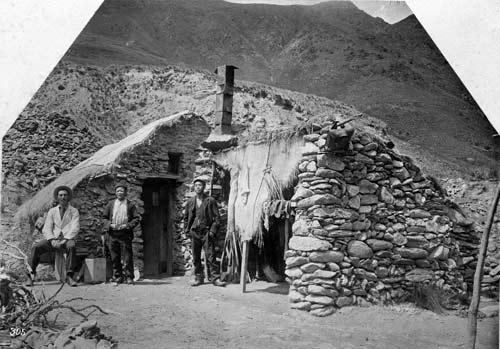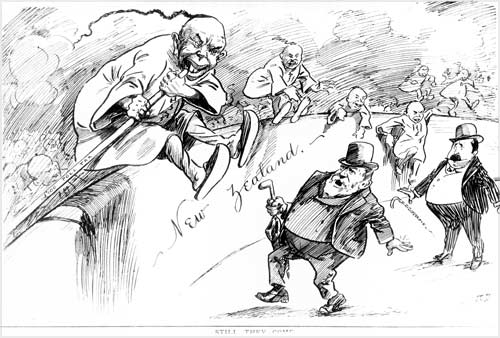Kristen Ng aka Kiwese went to the Diverse Bananas, Global Dragons’ Conference in Auckland, to be told she was in fact white on the inside, but her yellow skin gave her great job prospects in the corporate business world.
I was born in Wellington. So was my dad. My mum was born and raised in Gisborne. My great-great-granddad came to New Zealand over 100 years ago to mine for gold. I’m Chinese.
That last sentence is the reason why I generally avoid Courtenay Place on Wednesday, Friday and Saturday nights, as I dread the possibility of receiving Bruce Lee-style karate noises from drunk, hair-gelled white boys in Hallensteins shirts, where their laughter is echoed by other drunk, hair-gelled white boys in Hallensteins shirts.
While my experience of such overt racism has been pretty low growing up in New Zealand, the classic upwards stretch of the eyes with index fingers, the misdirected Konichiwa, the cake-taking “THE AIRPORT IS THAT WAY!” – all remain fixed in my memory as a reminder of one thing – I am different, I am Asian, white people are not different, white people are not Asian. I embrace that. It is who I am. Yum cha waitresses will always consult *me* at a table of friends. I don’t need, or want, to be white. Conversely, I don’t speak Cantonese, I do not belong to any Chinese Association and I have never been to Easter Tournament.
Last month, I decided to attend the Diverse Bananas, Global Dragons Conference 2014 at the University of Auckland Business School. The Conference was held in 2005-2007 and 2009, though it seems this year’s return from a five-year hiatus will be the last for a while, as the well-meaning head organisers from the New Zealand Chinese Association closed the conference with comments in the vein of “we gettin’ too old for dis shit!”

Chinese gold miners in Otago, circa 1900. Image from Te Ara.
The conference was rife with interesting and noteworthy juxtapositions. The Chow brothers – original Hong Kong boys turned sex industry kingpins, speaking on the same bill as Chinese Poll Tax historian and author James Ng. Lectures about how the first Chinese immigrants arrived just two years after the signing of the Treaty of Waitangi, next to urgent calls for the Chinese to prove ourselves and justify our presence with quality contributions to society. A harking back to ancestry and traditional burial customs for the dead, underpinned by a wider narrative of insistent internal whiteness.
“‘Banana’ is a term used to describe Chinese who are ‘yellow on the outside but white on the inside’” Kai Luey, Co-Chair, told the New Zealand Herald, in an article somewhat distastefully titled ‘Conference to tackle Asian growth.’
Bananas were given out as free snacks at the door. An eerie sense of cannibalism swept throughout the weekend.
I have several skins to peel on this.
The ascription of skin colour as a defining feature of someone’s identity is flawed and stupid. Surely, if we are striving towards this idealised form of happy, inherently positive ‘multiculturalism’ in New Zealand, it seems backwards to be identifying Chinese New Zealanders as “white on the inside.” As if whiteness is the feature that will see us accepted in society. As if our internal whiteness will exonerate us of our yellow skin.
Fuck. That. Why are Chinese people telling me I am white again? Pretty sure my great-granny didn’t spend years of her life scraping baby shit out of white diapers in an East Coast laundry for me to be told I am anything but myself.
It is a deep seated issue. We live in a society where telling someone they are Asian can be used as an insult. Where NZ Chinese can attack other NZ Chinese by saying “oh my god you are so Chinese.”
The banana label not only brings forth an internal cultural disassociation from one’s skin, but also implies an inherent lacking of genuine ‘Chineseness’ – we are a deviation from the authentic, original product.
The ‘celebration’ of ethnic diversity in New Zealand requires those of ethnic backgrounds to perform their culture in order to demonstrate how diverse we are as a nation. The ‘Rhythms of Aotearoa’ performance saw authentic Samoan, Indian and Chinese dancers fuse their styles together in a presentation of “sensuous moves,” accompanied by an appropriate photo slideshow of Samoan, Indian and Chinese people contributing to society. I mean no disrespect to these talented dancers, but it is a fine example of the way culture can be used as a commodity, to shine like coloured jewels in New Zealand’s big White Crown.
The conference tended to follow a ‘Started From the Bottom Now We Here’ narrative of model minority Chinese who had made good through working hard and saving hard – with some families spanning back to the Gold Rush in the South Island during the late 1880s, while others arrived after the amendment of immigration laws in the 1980s. Hard work and success (read: wealth) appeared to be the key goals of the Chinese project.
It got me thinking…
Q: Who is this allied Chinese community? Is it the fourth generation Chinese who have New Zealand accents as thick as Footrot Flats, the Masters students who decided to live here, the little old grannies that sit at home and only speak Cantonese?
A: It doesn’t matter. We are all united under this beautifully convenient umbrella of Chinese ethnicity, the ticked box, the same values and histories, the same ‘voice.’
Don’t worry guys, John says National MP Dr Jian Yang is representing the Chinese in Parliament. #allgood
It was interesting and mainly odd to be addressed as a member of what is commonly mythologized as the ‘Chinese community.’ Hon. Judith Collins, Ethnic Affairs Minister opened the event on the Friday night with a resoundingly incorrect “NI HAO,” replacing the Right Honourable John Key who was off in the Pacific Islands.
“Sadly, there have been some recent political statements that have taken aim at Chinese migrants to New Zealand,” Collins said to the crowd of a hundred or more, “don’t pay any attention to these ill informed comments. Please don’t let them hurt your feelings. Please don’t let them upset you.”
Huh? Whose feelings are being hurt? Who are you talking to? J-Coll boosted the scene straight after her speech, missing out on the deep fried wontons, red wine and questions about how the garden is going.

Judith Collins at the firing range. From her Facebook page.
On Saturday morning, there was an enchantingly persuasive call to arms by prominent lawyer Mai Chen; telling young Chinese to redefine success, become leaders in their fields, combat discrimination and “preach a sermon of peace” to New Zealanders who may be threatened by our presence. It was estranging to be addressed in this way. Growing up in Wellington, I’d never really thought my existence as a Chinese could be considered as part of a greater wave of unwelcome migration. Auckland is very different in that sense, with a much larger Chinese population than Wellington, and according to statistics from Massey University Pro-Vice Chancellor Professor Paul Spoonley, the majority of them are born overseas. I did not realise that NZ-born Chinese account for only 26% of all Chinese in New Zealand.
“Immigration is always already a war.”
– Paul Gilroy, ‘Multiculture in Times of War‘

Anti-Chinese cartoon by J. Blomfield, 1905. Image from Te Ara/Alexander Turnbull Library.
I thought many of the speakers were generally insightful, thought provoking and even #inspiring. There was a #diverse line-up of topics ranging from personal journeys of identity, cooking for Barack Obama at the White House, Chinese brush painting, climbing the corporate ladder at ANZ, to cross-cultural dating and parental responses.
Though the wider narrative of Chinese people telling other Chinese people they are high achievers based on their race and upbringing, does not appear to dispel such race-based attitudes in New Zealand society. I could not help but think the individual successes of each speaker surely must be attributed to their own hard work, ambition and sacrifice – not their skin colour.
What sense of Chinese-ness was being appealed to here? While many NZ-born Chinese have roots in Southern China, the greater NZ Chinese population come from all over. Among the NZ Chinese, there is no real binding language but English. People cook all different styles of Chinese food, etc.
If what we are left with is deep fried spring rolls, Amy Chua quotes and allusions to Crouching Tiger, Hidden Dragon, then we have some issues to deal with.
Chinese people, like all others, are individuals with individual desires, upbringings, experiences, passions, views and identities, which cannot conveniently be collated to rally under the banner of the Chinese community. If the aim of the Going Bananas Conference is to promote ‘diversity’ in the New Zealand population (one of those words used so frequently that it eventually loses all meaning), then is lumping everyone of the same ethnic background into united group an act which advances or diminishes a Chinese New Zealander’s claim to individuality?
Some of the biggest stoners I know are Chinese.
END
Read Renee Liang’s brilliant speech at the conference. Opens with her poem ‘Chinglish.’
The 2014 Conference program is online here.
No hate, just opinion.

its a nice read your blog…its funny though that you say you claim to be different but wishes to the not stated as different by the Chinese community…Im asian 1st gen NZ, I personally feel its rather stupid to even state that im different to any other people no matter the colour….this is my own opinion im writing here but I actually think cultural communities is what pushes integration of NZ backwards…from my point of view all it does is allow the isolation of those cultural groups to stick with their own…
LikeLike
Thank you for sharing your thoughts. I had been invited as one of the speakers, and I found the conference well organized, educational, respectful, and most interesting… compared to what we have here in Vancouver, Canada.
What you have in NZ is purposeful, with a goal to share knowledge and history — with everyone– young, older, Asian, non-Asian, Maori. Very inclusive. You all have much to be proud of. Your community has its act together.
Compare what you have to the cesspool of nepotism and corruption we have here in Vancouver. It’s always easy to find issues and difficulties, but what you’ve identified pales to the rampant destruction of the Chinese Canadian community here. Although Vancouver has one of the largest population of ethnic Chinese outside of Asia, our community is divided, directionless, and often used as political window dressing. Our seniors in Chinatown are currently being displaced at an alarming rate. Self-proclaimed Chinese community leaders only care for photo-ops with politicians. Much of our Head Tax (equivalent of NZ’s Poll Tax) apology and compensation ended up in the control of new migrant Chinese who used it to promote themselves with dinners, photo-ops, token educational gestures … not much of a legacy. Compare to NZ, you have these banana forums, seniors who are engaged, and young people who are proud of their heritage.
To understand what I am trying to share, please do a Google street view in Vancouver’s Chinatown. You will see that most of our buildings are boarded up, rundown with graffiti everywhere… and hardly any people (visitors) walking our streets, to what used to be the pride of our community. Vancouver’s Chinatown is currently being gentrified, and the lost sense of community is definitely being felt.
I wish we had leadership like what I saw and experienced during my NZ sojourn.
Thank you for reading my thoughts, it’s wonderful to see young people like yourself speaking out and sharing your thoughts! Please keep up your good work.
All the best,
David
LikeLike
[…] Conference 2014, I heard you speak on a panel with Dr. Pita Sharples about Maori-Chinese relations. As much as I dislike the ‘banana’ analogy, it would seem you are more brown on the inside than white!! How do you balance your support for […]
LikeLike
[…] with Chinese sounding names and 2) deprived, hardworking Kiwi families, I can finally understand what Mai Chen meant at the Bananas Conference about us Chinese needing to combat discrimination and redefine for ourselves what it is to be a […]
LikeLike